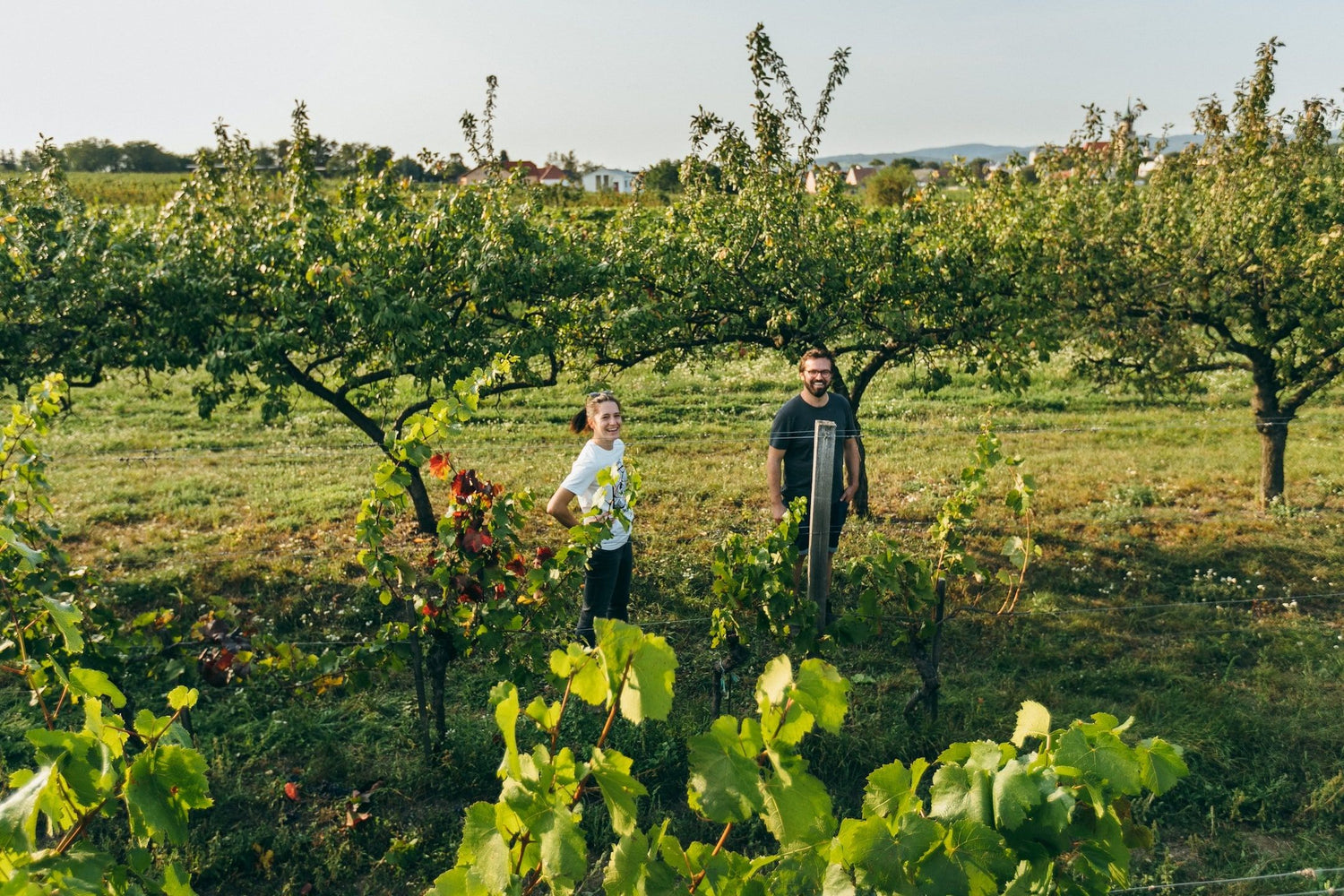
Franz Weninger
Burgenland, Austria
Franz Weninger is a trailblazing winemaker from Austria’s Burgenland region, celebrated for his dedication to biodynamic farming and his tireless pursuit of authenticity in wine. Based in the village of Horitschon, Weninger has become a leading figure in the movement toward natural, terroir-driven wines in Austria and Hungary. With a focus on Blaufränkisch and an unwavering belief in minimal-intervention winemaking, Franz Weninger’s work exemplifies the new wave of sustainable viticulture in Central Europe.
-

-
- demeter
- respekt biodyn
- EU Organic Certification
Franz Weninger comes from a long line of winemakers, and his family estate has been producing wine in Burgenland since the early 20th century. In 1982, the Weninger family expanded their horizons by purchasing vineyards across the border in Hungary, marking the beginning of their presence in the neighboring country’s Sopron region. Franz took over the Austrian side of the winery in 2000 and later assumed control of the Hungarian estate, bringing his vision for biodynamic farming and natural winemaking to both sides of the border.
One of Franz’s key innovations was his early decision to convert both the Austrian and Hungarian vineyards to biodynamic farming. In 2006, Weninger’s vineyards were certified biodynamic by Demeter, solidifying his commitment to sustainable viticulture. This method of farming not only enhances the health of the vines and soil but also ensures that his wines are pure expressions of the land, free from synthetic chemicals and additives.
For Franz Weninger, biodynamic farming is more than just a set of techniques—it’s a philosophy that emphasizes the interconnectedness of the vineyard ecosystem. Biodynamic practices revolve around maintaining the natural balance of the soil, encouraging biodiversity, and working in harmony with cosmic rhythms. Weninger strictly adheres to the principles of biodynamics, using natural preparations to enhance soil health and following the lunar calendar to guide vineyard activities.
His decision to embrace biodynamics stems from a desire to allow the terroir to fully express itself in his wines. By avoiding artificial interventions in both the vineyard and cellar, Weninger’s wines capture the unique characteristics of the soil, climate, and vintage. His approach is rooted in the belief that great wine is made in the vineyard, and that the winemaker’s role is to guide, rather than control, the process.
Franz Weninger is best known for his work with Blaufränkisch, the signature red grape of Burgenland and a variety that thrives in the region’s diverse soils and Pannonian climate. Blaufränkisch is capable of producing wines with structure, complexity, and vibrant acidity, making it a favorite among winemakers and wine lovers alike. Weninger has been a leading advocate for Blaufränkisch, working tirelessly to showcase its potential on the world stage.
Weninger’s Blaufränkisch wines are known for their elegance, depth, and ability to age. He crafts his wines with a light touch, using spontaneous fermentation, native yeasts, and large oak barrels for aging. By allowing the wines to ferment naturally and minimizing the use of sulfur, Weninger ensures that each bottle reflects the true character of the vineyard.
In addition to Blaufränkisch, Weninger also works with other regional varieties such as Zweigelt and Merlot, but it is his devotion to Blaufränkisch that has garnered him international acclaim. His wines from sites like Dürrau, Hochäcker, and Kirchholz are celebrated for their precision and purity, offering a profound sense of place.
One of the unique aspects of Franz Weninger’s work is his dual presence in Austria and Hungary. His estate in Burgenland is complemented by his vineyards in the Sopron region of Hungary, just across the border. These vineyards share a common history with Burgenland, having once been part of the same wine region before the borders were redrawn after World War I. Today, Weninger’s Hungarian wines offer a fascinating glimpse into the shared terroir of these two regions.
In Sopron, Weninger cultivates Blaufränkisch and other regional varieties, using the same biodynamic practices he employs in Austria. The wines from Sopron are known for their distinct minerality, reflecting the region’s unique combination of clay and limestone soils. By working in both Austria and Hungary, Franz Weninger has helped to elevate the profile of Hungarian wines, particularly those made from Blaufränkisch, which he believes is one of Central Europe’s greatest grapes.
Franz Weninger’s approach in the cellar is as natural as his work in the vineyard. He avoids the use of additives, and his wines are unfiltered and unfined, allowing them to develop naturally. Weninger’s preference for spontaneous fermentation with native yeasts ensures that the wines retain their sense of place. He uses large, old oak barrels for aging, allowing the wines to evolve gently without being overpowered by wood flavors.
Weninger’s wines have found a global audience, with natural wine enthusiasts and critics praising their purity and vibrancy. His ability to balance tradition with innovation has made him a key figure in Austria’s natural wine movement, and his wines are now exported to top restaurants and retailers around the world.
Franz Weninger is a winemaker deeply committed to his land, his craft, and the future of sustainable viticulture. Through his work with biodynamic farming and natural winemaking, Weninger has become a champion of Blaufränkisch and a symbol of Austria’s new generation of winemakers. His wines, whether from Austria or Hungary, reflect the essence of their terroir and offer a glimpse into the future of winemaking in Central Europe. For those seeking authenticity and complexity in their wines, Franz Weninger’s portfolio is a testament to the power of nature and the art of letting the land speak through the wine.

